Higher Education in Ukraine
November 2, 2011
System of Higher Education of Ukraine
The structure of the higher education of Ukraine was built up according to the structure of education in the developed countries of the world as determined by UNESCO, UN and other international organizations.
The higher education constitutes integral part of the system of education of Ukraine as provided for by the Law of Ukraine “On Education”. It ensures the fun-damental scientific, professional and practical training by the following educational and qualification degrees: “Junior specialist”, “Bachelor”, “Specialist, Master”.
There are four levels of accreditation established pursuant to the status of higher educational institutions.
The higher education is received in high educational institutions of the respec-tive levels of accreditation on the basis of: basic general secondary education, com-plete general secondary education and educational-qualification degrees “Junior spe-cialist” and “Bachelor”, as well as “Specialist, Master” as postgraduate education.
Training of specialists in higher educational institutions may be carried out with the interruption of work (daytime education), without interruption of work (eve-ning, correspondence education), by the combination of these two forms, and for cer-tain professions – without attending classes.
Admission of citizens to higher educational institutions is made on the com-petitive basis according to skills and regardless of the form of ownership of an educa-tional institution and sources of payment for education.
There are four levels of accreditation established pursuant to the status of higher educational institutions:
- first level – technical school, vocational school and other higher educa-tional institutions equated to them;
- second level – college and other higher educational institutions equated to it;
- third and fourth levels (depending on the results of accreditation) – in-stitute, conservatory, academy, and university.
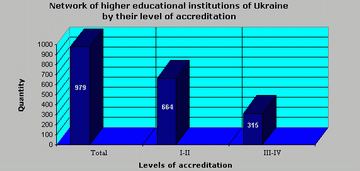
Higher educational institutions train specialists pursuant to the following educational and qualification levels:
- junior specialist – is provided by technical and vocational schools, other higher educational institutions of the first level of accreditation;
- bachelor – is provided by colleges and other higher educational institu-tions of the second level of accreditation;
- specialist, master – are provided by higher educational institutions of the third and fourth levels of accreditation.
The level system of higher education lies in the receipt of different educational and qualification levels at the respective stages of higher education.
The level system of higher education lies in the receipt of different educational and qualification levels at the respective stages (phases) of higher education.
Taking into account the structure of higher education, its first phase contem-plates the receipt of higher education of the educational-qualification level “Junior specialist”; the second phase – “Bachelor” (basic higher education); the third phase – “Specialist”, “Master” (complete higher education).
The level system of higher education may be realized both through the con-tinuous program of training and differentially – according to the structure of the level system.
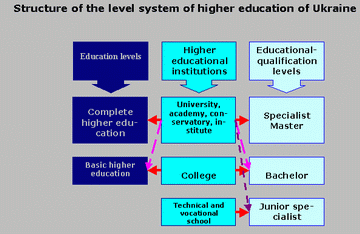
Higher educational institutions of the particular level of accreditation may train specialists pursuant to educational-qualification levels provided by educational insti-tutions of the lower level of accreditation.
Higher educational institutions of the state and other forms of ownership func-tion in the system of higher education. The network includes 979 higher educational institutions of I-IV levels of accreditation (vocational schools, technical schools, col-leges, institutes, academies, and universities).
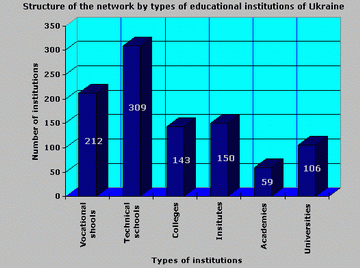
The network of higher educational institutions of I-II levels of accreditation in-cludes 664 higher educational institutions, including 593 institutions of the state form of ownership and 71 ones of other forms of ownership, with 528 thousand students in total.
The network of higher educational institutions provides education for 392 stu-dents per each 10 thousand of population.
The network of higher educational institutions of III-IV levels of accreditation numbers 315 institutions, including 223 institutions of the state form of ownership. Among them there are 106 universities, 59 academies and 150 institutes. 48 universi-ties and academies have the status of the national ones. 1,403 thousand students study at universities, academies, institutes, including 1,086 thousand students of 17 – 24 years old, who receive higher education, that constitutes 90 percent of the total num-ber of students.
The network of higher educational institutions provides education for 392 stu-dents per each 10 thousand of population.
Specialists having degree of higher education are trained in 70 areas that in-clude more than 500 professions.
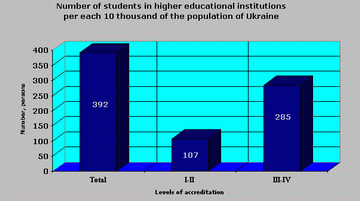
Structure of the students admission by areas of training
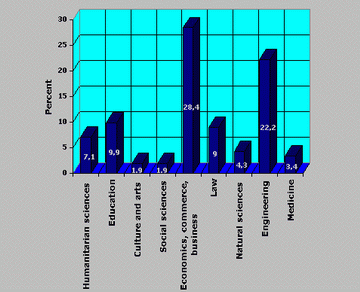
Areas of training
Requirements to the contents, scope and level of the educational and professional training in Ukraine are determined by the State Standards of Education.
Requirements to the contents, scope and level of the educational and profes-sional training in Ukraine are determined by the State Standards of Education. The state standard of education means the aggregate norms that specify requirements to the educational and educational-qualification level.
The state standard of education is developed for each area of training (profes-sion) for various educational-qualification levels.
Management of education
The management of education is performed by government regulatory authori-ties and local authorities.
The government regulatory authorities in the area of higher education include:
- The Ministry of Education and Science of Ukraine;
- Central authorities of the executive power of Ukraine, to which educational in-stitutions are subordinated;
- The Supreme Certification Commission of Ukraine;
- The State Accreditation Commission.
The Ministry of Education and Science of Ukraine is the central body of the government executive power performing the management in the area of educa-tion.
The Ministry of Education and Science of Ukraine:
- participates in the determination of the state policy in the area of education, sci-ence and professional training of specialists;
- develops the program of the development of education, state standards;
- ensures the connection with educational institutions, government authorities of other countries with respect to issues falling within its competence;
- makes accreditation of higher and vocational educational institutions, issues li-censes and certificates to them;
- organizes certification of pedagogical and scientific-pedagogical personnel in order to provide them with qualification degrees, pedagogical and scientific ranks.
The Supreme Certification Commission of Ukraine organizes and conducts the certification of scientific and scientific-pedagogical personnel, manages the work re-lated to giving scientific ranks, giving academic degree of a senior staff scientist.
In accordance with the results of the accreditation of higher educational institu-tions, the Ministry of Education and Science of Ukraine together with ministries and departments, to which educational institutions are subordinated:
- determine the correspondence of educational services to the state standards of a certain educational-qualification level in particular areas, gives the right to issue a document of education pursuant to the state standard;
- determine the level of accreditation of an educational institution;
- inform the community regarding the quality of educational and scientific ac-tivities carried out by higher educational institutions.
Bodies of the public self-regulation in the area of education include:
- The All-Ukrainian Congress of Educational Specialists;
- General meeting of the staff of an educational institution;
- District, city, oblast conference of pedagogical personnel;
- Congress of Educational Specialists of the Autonomous Republic of Crimea.
Local authorities in the area of education submit their proposals regarding the formation of the state policy in the are of education.


